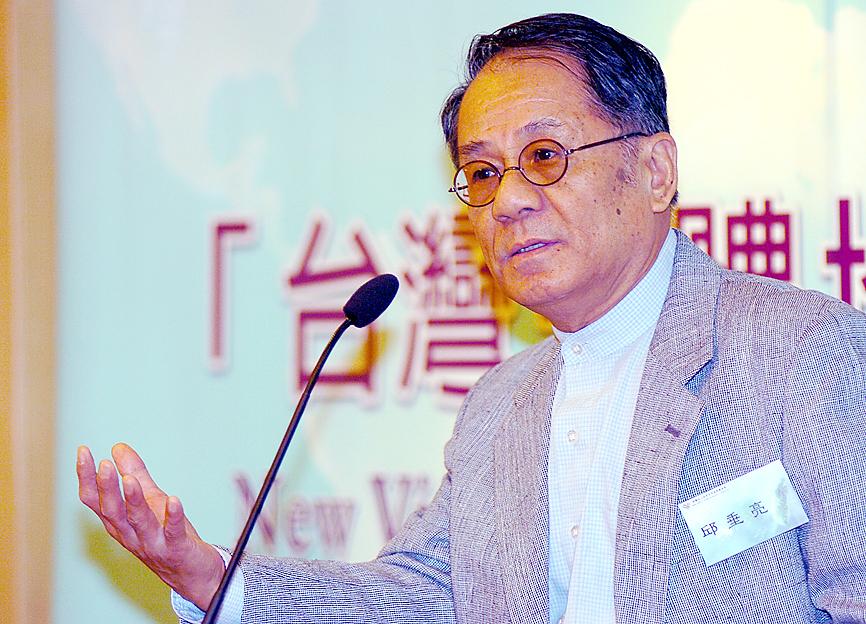The government yesterday expressed grief over the death of former Presidential Office policy adviser Chiou Chwei-liang (邱垂亮), while highlighting his contributions to democracy as well as Taipei-Canberra ties.
Chiou died in Brisbane, Australia, yesterday. He was 84.
President Tsai Ing-wen (蔡英文) was sorrowful to learn of Chiou’s passing, Presidential Office spokesman Xavier Chang (張惇涵) said in a statement.

Photo: Lu Chun-wei, Taipei Times
Tsai remembered Chiou’s lifelong contributions to Taiwan’s democracy movement, saying he often spoke for Taiwan on international occasions, drawing on his profound knowledge, Chang said.
Chiou was also committed to fostering talent and conserving Hakka culture, while contributing to advancing the Taiwan-Australia friendship, Chang said.
Offering her condolences to Chiou’s family, Tsai instructed the Ministry of Foreign Affairs and its staff in Brisbane to provide necessary assistance to the family, he said.
Losing Chiou is a severe loss for Taiwan, and he would be remembered for his perseverance that is typical of Hakka people, Vice President William Lai (賴清德) wrote on Facebook.
Lai thanked Chiou for his spiritual heritage, writing: “We will continue your efforts in protecting Taiwan’s hard-won freedom and democracy.”
Chiou was born in Miaoli County in 1938. After graduating from National Taiwan University’s Department of Foreign Languages and Literatures, Chiou obtained a doctorate in politics from California State University.
Chiou taught political science at the University of Queensland for more than 40 years and often discussed Taiwanese issues at international seminars, the ministry said in a news release.
He also built rapport with many heavyweight politicians in Canberra and offered help to Taiwanese compatriots as well as the ministry’s work there, it added.
In 2003, the Australian government awarded Chiou a medal, marking his special contributions, the ministry said.
The ministry also expressed admiration for Chiou’s character and achievements, saying it is grieved over his passing.
Additional reporting by CNA

Taipei has once again made it to the top 100 in Oxford Economics’ Global Cities Index 2025 report, moving up five places from last year to 60. The annual index, which was published last month, evaluated 1,000 of the most populated metropolises based on five indices — economics, human capital, quality of life, environment and governance. New York maintained its top spot this year, placing first in the economics index thanks to the strength of its vibrant financial industry and economic stability. Taipei ranked 263rd in economics, 44th in human capital, 15th in quality of life, 284th for environment and 75th in governance,

The Sports Administration yesterday demanded an apology from the national table tennis association for barring 17-year-old Yeh Yi-tian (葉伊恬) from competing in the upcoming World Table Tennis (WTT) United States Smash tournament in Las Vegas this July. The sports agency said in a statement that the Chinese Taipei Table Tennis Association (CTTTA) must explain to the public why it withdrew Yeh from the WTT tournament in Las Vegas. The sports agency said it contacted the association to express its disapproval of the decision-making process after receiving a complaint from Yeh’s coach, Chuang

Control Yuan Secretary-General Lee Chun-yi (李俊俋) tendered his resignation last night, admitting that he had misused a government vehicle, as reported by media. His resignation was immediately accepted by the Control Yuan. In a statement explaining why he had resigned, Lee apologized for using a Control Yuan vehicle to transport his dog to a pet grooming salon on May 20. The issue first came to light late last month, when TVBS News reported that Lee had instructed his driver to take the dog to the salon. The news channel broadcast photos that it said were taken by an unnamed whistle-blower, which purportedly showed the

A former officer in China’s People’s Liberation Army (PLA) who witnessed the aftermath of the 1989 Tiananmen Square massacre has warned that Taiwan could face a similar fate if China attempts to unify the country by force. Li Xiaoming (李曉明), who was deployed to Beijing as a junior officer during the crackdown, said Taiwanese people should study the massacre carefully, because it offers a glimpse of what Beijing is willing to do to suppress dissent. “What happened in Tiananmen Square could happen in Taiwan too,” Li told CNA in a May 22 interview, ahead of the massacre’s 36th anniversary. “If Taiwanese students or